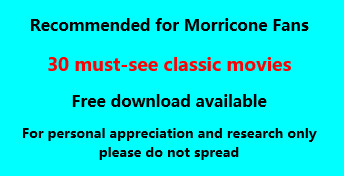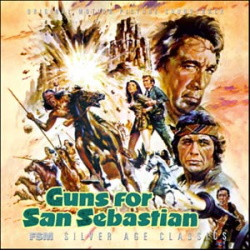GUNS FOR SAN SEBASTIAN (1968)
Guns for San Sebastian is an action adventure from French director Henri Verneuil. It stars Anthony Quinn as Alastray, a deserter during the Mexican civil war, who is given sanctuary from the Spanish army by a kindly priest (Sam Jaffe). When the priest is murdered by bandits en-route to the nearby town of San Sebastian, Alastray pretends to be him, intending to swindle the villagers. However, when they welcome him warmly, he begins to realize the error of his ways. Eventually, the Spanish arrive in San Sebastian to arrest Alastray; they are aided by Teclo (Charles Bronson), the leader of the gang who murdered the real priest, and who has been terrorizing the village for years. Feeling a responsibility to his new community, Alastray arranges for a shipment of weapons to be delivered to San Sebastian, and pledges to help the villagers free themselves from Teclo’s tyrrany.
Morricone’s score for Guns for San Sebastian is yet another entry in his terrific series of Spaghetti westerns, although this one acts as something of a bridge between the more anarchic tones of his earlier work, and more operatic style he would later adopt in Once Upon A Time in the West. The whole thing is anchored by a sweeping main theme, which is introduced in the opening “Overture,” a mass of soaring voices, strings and pianos, and rousing percussion, accented with Spanish guitars, lilting oboes and one of Edda dell’Orso’s legendary haunting wordless vocal performances. There are several restatements of the main theme throughout the score, with notable performances coming in the brilliant “Building the Dam,” and in a more introspective and downbeat arrangement for male voices and stark orchestrations in “The Villagers Prepare to Blow Up the Dam.”
Considering the nature of the film there is a lot of action music too. “The Chase” is a blistering piece, blending harsh fluttering recorders, pounding percussion, powerful triumphant brass, and the choir as only Morricone could. Later cues like “The Assault,” the uncompromisingly dissonant “Leon Fights Teclo,” “The Burning Village,” and the sensational “The White Stallion,” are equally excellent; Edda dell’Orso extremely powerful vocals in “The Assault” have to be heard to be believed.
The score’s recurring Love Theme is a truly stunning piece of romance scoring for strings, guitar, and choir, and may be closest Morricone ever got to the religioso sound of Miklós Rósza; it’s statements in “Kinita’s Plea,” “Leon Tells His Love,” “Leon Leaves Kinita,” and finally in the ecclesiastically-flavored and occasionally quite stark “End Titles,” are all equally sublime; the merest hints of a tolling bell really adds to the epic scope of it all. Also of note is “The Long Trek,” an abstract piece of suspense and tension that uses layered strings interesting ways to convey the sensation of a harsh burning sun on a desert landscape, while also containing a sense of stark beauty, mostly from the woodwinds.
Guns for San Sebastian is yet another terrific Morricone western, featuring a superb sweeping main theme, one of his most lush love themes, and some terrific violent action. The version I have reviewed here is the hour-long version released by Film Score Monthly, but there are shorter versions that focus on the highlights that may provide listeners with a more concise listening experience.
Track Listing: 1. The Overture (3:45), 2. Prologue/The Chase (2:47), 3. Church Music/Sneaking Away (1:46), 4. The Long Trek (5:11), 5. The Assault (1:29), 6. The Bandits/Leon Tied/Bleeding Statue (2:46), 7. Kinita’s Plea (2:01), 8. Restoring the Village (1:08), 9. Teclo Shamed/Surveying the Fields (2:04), 10. Building The Dam/Hymn For San Sebastian (1:26), 11. Leon Fights Teclo (1:56), 12. The Burning Village (2:36), 13. Leon Tells His Love (2:52), 14. Leon Leaves Kinita (2:53), 15. Music At The Governor’s Dinner (1:51), 16. Army March/Yaqui Camp (1:41), 17. The White Stallion (1:33), 18. The Gift (3:23), 19. Gift Returned/Leon’s Mass/The Attack (3:34), 20. The Villagers Prepare To Blow Up The Dam (1:27), 21. Teclo’s Death/Victory (1:56), 22. End Title (4:01), 23. The Chase – Alternate (1:54), 24. Love Theme from Guns for San Sebastian (Leon Tells His Love) – Album Version (2:51). Film Score Monthly FSM-9-14, 59 minutes 56 seconds.












